What is the best free image editing software that is fast, can edit raw files and work without lags? Depending on the task, you may need different software and in order not to choose among dozens available online, here is a list of best free photo editors in 2019.
Each picture editor is unique and has its own strong image editing features.
Many free photo editors offer a very limited selection of tools if you don’t pay for a subscription or don’t put a watermark on the exported images. However, none of the image editing software presented here has such limitations. Whichever option you choose, you can be sure that there aren’t any hidden tricks which could be unpleasant for you.
If you’re ready to pay for your software, look through the list of Top 10 Best Photo Editing Softwares.
Top 10 Free Image Editing Softwares
While selecting programs for my list, I thoroughly evaluated them according to several criteria: design, learning curve, support of RAW, PNG files, and professional tools for work with photos. Thus, I have collected picture editing software, using which you can perform basic portrait enhancement, color correction and quickly organize images. Each of these programs has a distinguishing feature and is absolutely FREE.
1. Gimp
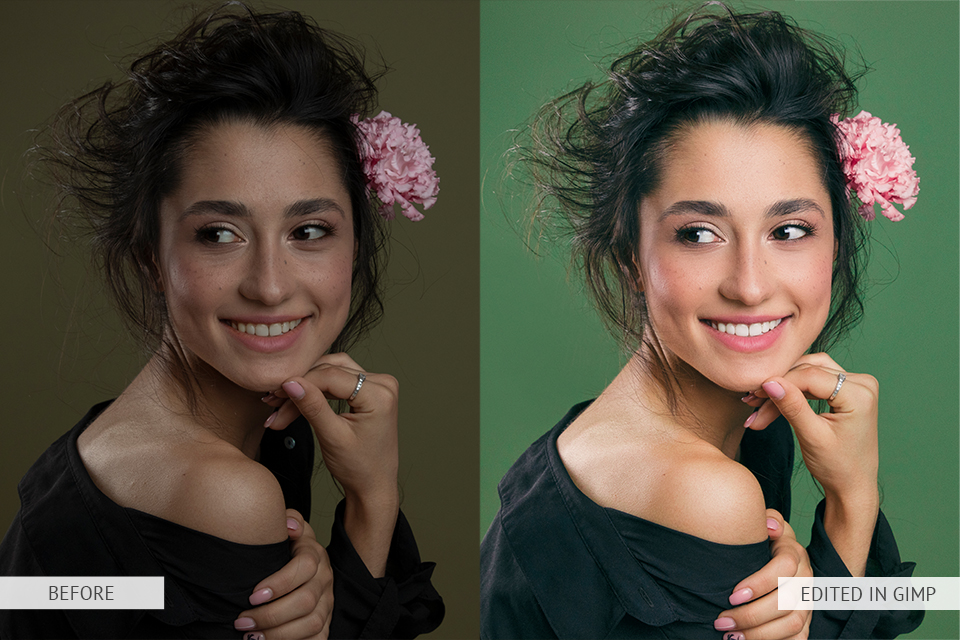
Platforms: Windows / Mac OS / Linux
Pros:
- Open source
- Supports RAW files
- Functionality expands through plug-ins
- Professional tools for photo editing
- Easy learning curve
Cons:
- Lack of batch photo editing
- Weak features for work with color
GIMP is a great free photo editing software and the best choice for Linux. Using it, you can easily perform image retouching, for example, eliminate skin imperfections with a Healing or Cloning tool, apply grunge filter or add an interesting effect. This image editor supports RAW files but doesn’t provide batch image editing. Also, it will be appealing to artists or web-developers. GIMP offers plenty of popular drawing and modeling tools including brushes, shapes, ready-to-use templates, etc.
One of the peculiar features of this image editing software is that it is built on open source. This allows you to manually change lines of code, for instance, to fix or expand the functionality. You don’t have to wait for the next update as you can upgrade this photo editor on your own.
I would like to mention that GIMP supports different plug-ins, that’s why its functionality can be constantly expanded, from actions to brushes. Many of them come pre-installed and you can download more from an official glossary. If it’s not enough, you can even install Photoshop plug-ins.
2. PhotoScape
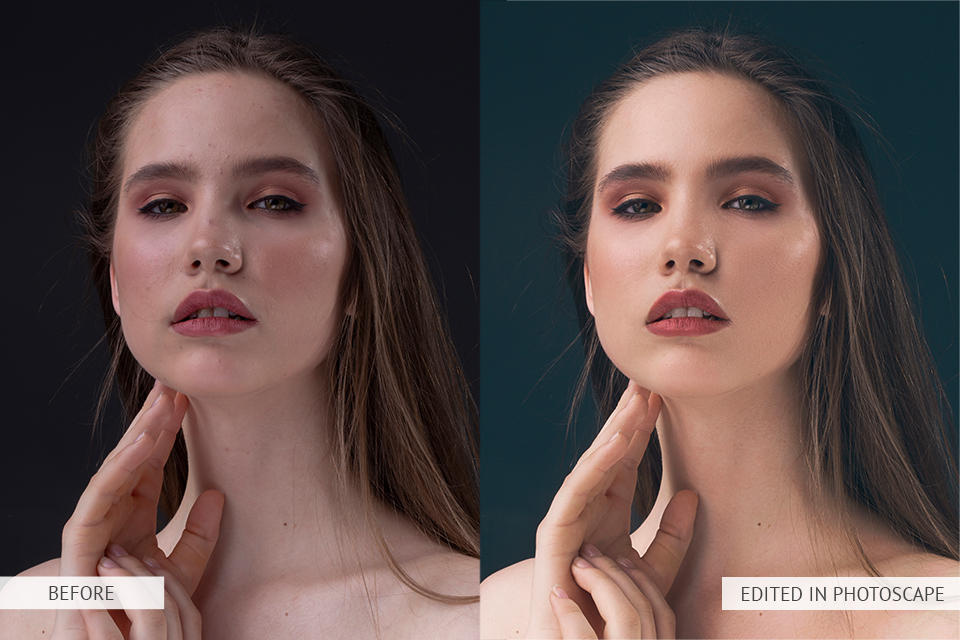
Platforms: Windows, Mac OS
Pros:
- Unique tools to create GIFs
- Modern interface design
- Batch picture edit
- Raw files converting
- Large selection of filters
Cons:
- Limited possibilities
- Lags can occur
PhotoScape may look like a simple photo editing software with a quite outdated design but a few minutes of work will show many amazing and unique functions. The main menu includes several separate interfaces, using which you can edit your photo, create GIF, split and combine images and perform picture transformation.
Among interesting features, I would like to name unique tool to create GIFs. You can simply add a few shots from one scene and create a GIF. The program will do it automatically through built-in AI.
In terms of photo editing tools, PhotoScape adheres to the basics. It offers all standard tools such as adjustment of exposure, contrast, shadows, brightness, curves, filters, and effects. Among all the other tools, I especially like the function of automatic skin defect correction – despite expectations, it works quite accurately and causes no complaints.
As soon as you finish, this free image editing software will offer different variants for printing the result: passports, calendars, templates, schedules, etc. You can turn screenshots into proper images and convert JPEG files into RAW and vice versa.
3. RawTherapee
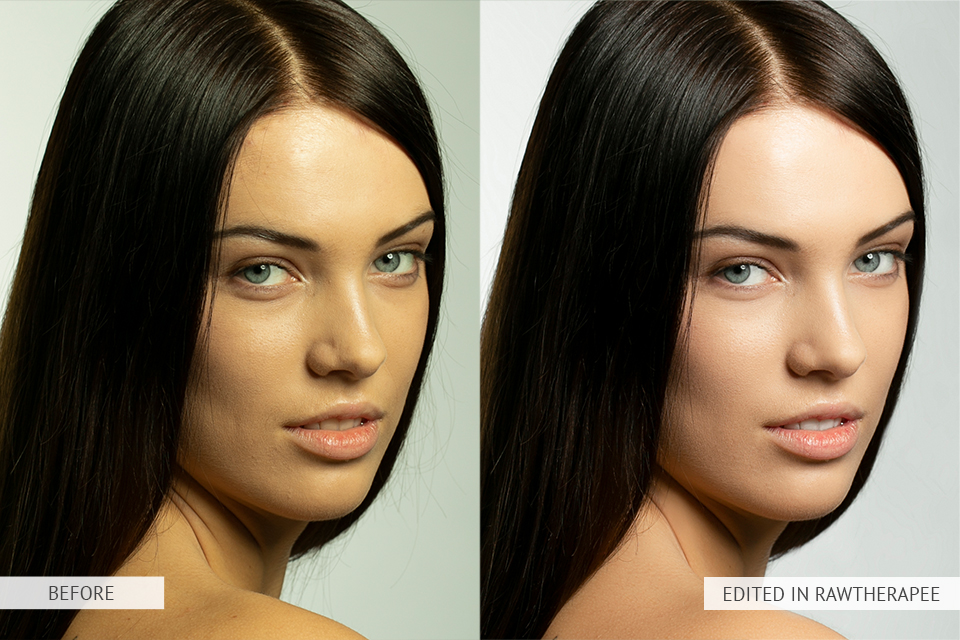
Platforms: Windows / Mac OS / Linux
Pros:
- Convenient and fast organizer
- Deep color correction
- Supports presets
- Supports RAW, PNG files
- Open source
Cons:
- Not suitable for professional photo retouching
- May lag
RawTherapee is a free photo editing software for deep color correction and management of your pictures. This image editor is built on open source which allows you to expand its functionality by changing lines of codes. It’s worth mentioning that this image editing software is available not only for Mac OS/Windows but Linux as well. Since Adobe Lightroom is not available for Linux, RawTherapee will be the best decision.
This image editing software provides RAW files editing, advanced color correction, histogram reading, and displaying tones with high dynamic range (HDR). In addition, it offers a lot of tools for tone correction, noise removal, rotation, exposure control, shadows and lights change, tone adjustments and white balance regulation. Basically, RawTherapee is the middle between Photoshop and Lightroom in the shell of Adobe Camera RAW.
I would like to mention that the picture editor offers non-destructive image editing. All changes will not be applied until you export the edited RAW picture. Check out more Best Free Photo Editors that can be installed on your smartphone as well.
4. Photo Pos Pro
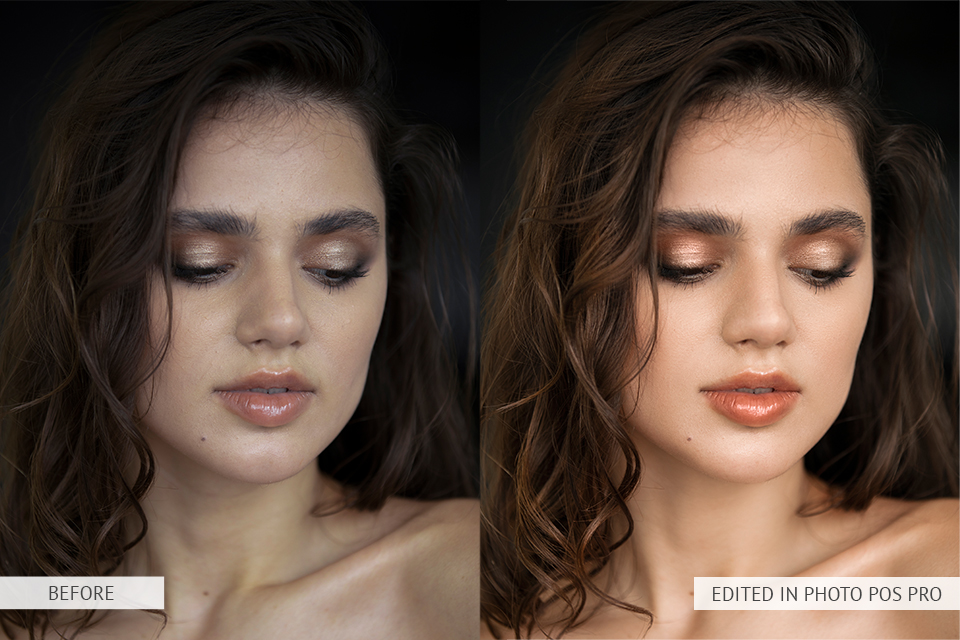
Platforms: Windows
Pros:
- Two image editing modes
- Customizable interface
- Basic color correction
- Easy learning curve
- Friendly customer support
Cons:
- Available only for Windows
- Limited file export
This image editing software has a modern, intuitive dark user interface design. You can save photos in all formats even in rare EMF and WMF. Also, there is a possibility to convert pictures to HTML and load them to web pages.
What I like most is that the interface selection based on the level of your skills (beginner, advanced and professional). It’s a nice feature, which makes it easier to figure out the specificities of this software.
Regardless of your needs, this new picture editing software offers a set of basic tools for image editing as well as a large selection of filters, the Clone Brush to remove stains, etc. These functions are organized in a user-friendly interface. The program can be a little slow but performs well during photo editing. In addition to that, it supports RAW and PSD files.
The only disadvantage is that pictures can be saved at a maximum resolution of 1024×2014 pixels which may be too small if you plan to print photos. For a bigger size, you can upgrade to Photo Pos Pro Premium.
5. Polarr
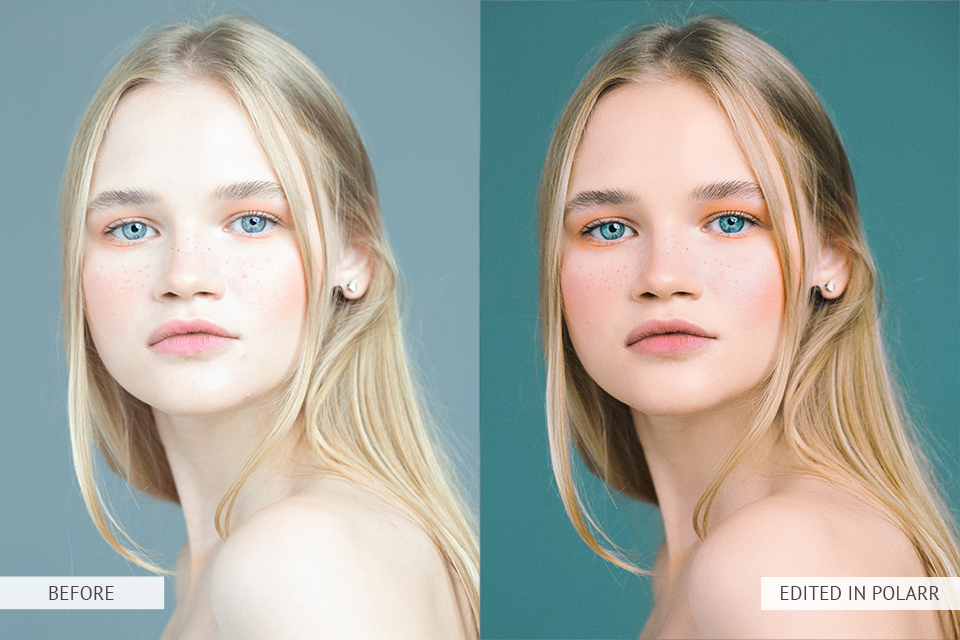
Platforms: Online / Windows / Mac OS / iOS / Android
Pros:
- Cross-platform
- Deep color correction
- A lot of drawing tools
- Intuitive interface
- Easy learning curve
Cons:
- There is a premium mode
- Limited file support in a free version
Polarr is one of the best cross-platform image editing software that offers a large number of unique filters along with basic photo editing tools. It’s worth mentioning that it was one of the first online photo editors which could upload and edit RAW images for free.
This program allows you to save a picture editing history, perform color correction on a professional level, work with light, photo details, add watermarks, etc. In the comparison mode, you can see an original and edited picture.
Among interesting features, I will note a separate mode for digital drawing. Developers created a special interface with different tools for this mode. You can upload semi-finished drawings there, color them or draw from the very beginning.
There are dozens of ready-made brushes, however, you can’t install them separately in a free mode. That’s why I can call this free photo editing software that is quite limited in functions.
6. Paint Net
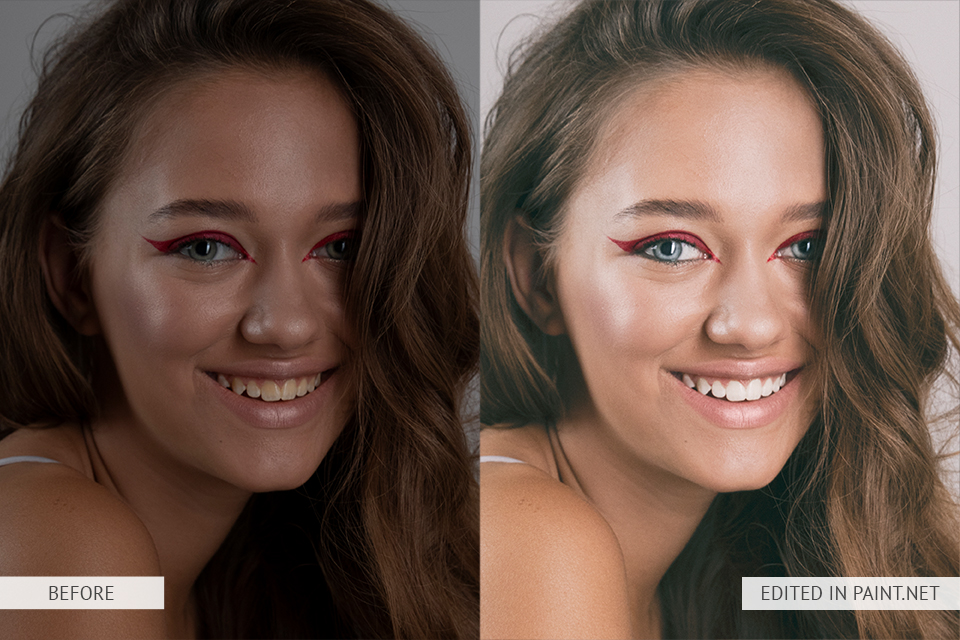
Platforms: Windows
Pros:
- Customizable interface
- Optimized for weak PCs
- Powerful photo edit tools
- A lot of filters
- Layers are available
Cons:
- Non-extensible through plug-ins
- For Windows only
PaintNet is a great photo editing software for those, who are beginning their picture editing work and don’t plan to do complicated tasks. This program doesn’t support RAW files, however, it supports JPEG, BMP, PNG, and TIFF. You can also convert files from different formats. New users like it because its interface is very simple.
This free image editing software provides a lot of tools and a possibility to work with layers. Even though these tools are limited in functionality, you can still carry out basic photo edit, remove skin blemishes, change the background, and get rid of red eyes effect. If you work on a graphic tablet, this software is a good choice.
I would like to mention some very nice special effects such as sharpness, blur, distortion, lettering, etc. You can even get some vintage effects in the Instagram style.
7. Fotor
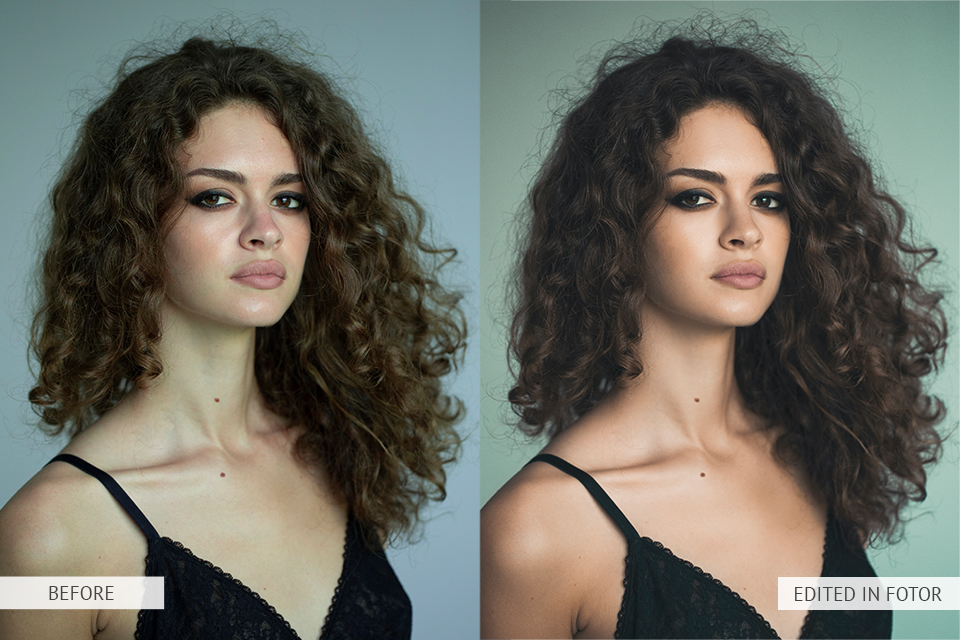
Platforms: Online
Pros:
- Easy learning curve
- It’s possible to use Fotor on any smartphone/PC platform
- Possibility to perform basic editing
- Offers some portrait enhancement tools
- A large number of filters/effects
Cons:
- Doesn’t support RAW files
- Lack of batch image editing
Fotor is used only for basic image editing. If you are a beginner, you will be satisfied with this photo editing software as it offers all the necessary tools. However, a big disadvantage is plenty of ads that can be quite annoying and distracting.
This free image editing software has a nice interface with 5 main toolbars, which is great for beginners. The first one includes basic functions such as cropping, transferring, size changing, etc. The second toolbar has all actions and filters that you can use to make your photo black and white, add glare, darken it, etc. Then you can find tools for image retouching. Portrait photographers will appreciate available functionality as it allows to add makeup, hide skin defects, etc.
The Text Tool deserves special attention. It offers dozens of built-in fonts, from classic Calibri to Arial and Bodoni that are often used for advertising. Besides, you can adjust the size, position, color, and transparency of the text. Using the latter, you can create something like a watermark.
8. PIXLR
Platforms: Online
Pros:
- Interface similar to Photoshop
- Supports RAW files
- Suitable for professional color correction
- Can be expanded through plug-ins
- Offers advanced filters
Cons:
- No layers
- Intrusive advertising
Pixlr is the best option if you are looking for the program similar to PS. You will see almost all the same tools as PS has and an extra possibility to customize them. Using this free photo editing software, you can highlight, blend, blur, and transform different parts of your pictures.
However, the biggest plus is RAW files editing which is not typical of a cloud-based image editor. The disadvantage of this software is advertising that distracts you from your working process.
This picture editing software also offers a simpler Express version that is used to carry out fast and slight image editing such as cropping, regulating some values, adding filters, effects, and stickers, customizing text, etc. The latter are constantly refilled with new entries, for example, holidays related or others.
This online picture editor is a great variant for beginners, who want to perform photo editing quickly.
9. InPixio
Platforms: Windows / Mac OS
Pros:
- Supports presets
- Works with RAW files
- Convenient, modern interface
- Offers deep color correction
Cons:
- Premium version
- Lacks batch photo editing
InPixio has a modern and stylish interface which is ideal for amateurs. The tools are located on the side panel and you mainly perform operations with 1-2 sliders. Color correction is not as deep as Lightroom offers but it’s also at a quite high level.
You can edit your photos quickly using presets or basic image editing tools that can be really helpful for beginners. There is a convenient mode to review changes in them before and after the picture editing process. Also, this free photo editing software offers the possibility to apply the same changes to several pictures at once.
It should be noted that InPixio is a big “family” of programs used to perform different tasks. It includes InPixio Photo Editor and 6 other programs for particular manipulations with pictures: Photo Clip, Photo Focus, Photo Maximizer, InPixio Photo Cutter, InPixio Photo Suite, and Photo Eraser. All of them are used to remove unwanted object from images, crop pictures, work with formats, fix focus, etc.
10. PiZap
Platforms: Online
Pros:
- There are 2 versions
- Simple interface
- A large number of fun filters and tools
Cons:
- High cost of premium accounts
- Doesn’t support RAW files
PiZap is an online image editor that offers more fun and flexible options than other programs. In a free version, you can adjust your images for posting on social media. However, if you want a file export with higher resolution, you need to get an expensive premium account.
This free image editing software has tools for basic tasks including color correction using HSL, curves as well as standard photo retouching using healing brushes and smart tools. There is a choice of “decoration” filters for a selfie (free options allow you to whiten teeth, remove stains and apply “blush”) and a huge choice of stickers.
Another interesting feature is that this picture editor is available in HTML and Flash versions, which makes it suitable for all devices.